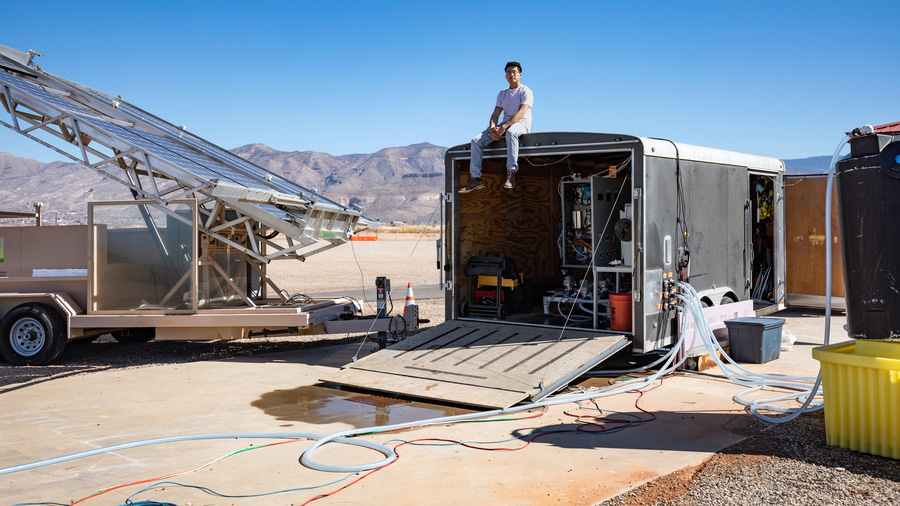Solar Energy: Energy Opportunities for Young Engineers
Solar Energy: Energy Opportunities for Young Engineers
By: Carol Milano

“The solar industry is growing rapidly, and consolidating,” reports Seth Masia, Executive Director (interim) of the American Solar Energy Society (ASES), “The big companies are becoming huge, while the smaller ones are getting pulled into the mother ship. It’s like the auto business during the ‘20s, when General Motors and Chrysler took over their sector.”
Solar energy systems can be used to provide heat or electricity. Solar photovoltaic (PV) systems, which can provide electricity anywhere, are the world’s fastest-growing energy source, according to Brandon Leavitt, CEO of Solar Service in Niles IL. “Solar thermal, which has been used for centuries, provides hot water and heat. Using the sun to heat water is a very practical solar application.”
In solar thermal systems, mechanical engineers work on pre-installation planning to determine the number of hot water panels. “[The engineers] design and balance all the system components to optimize performance.All collection, exchange, storage, piping and other fluid handling components must be sized precisely. Small details, like properly locating a $20 sensor in the right place, determine whether or not the system will work properly,” Leavitt discovered.
“The location for solar energy jobs is often counterintuitive,” said Leavitt, who has a mechanical engineering background,“Solar is not just for southern, sunny climates. Solar heating works best where it’s needed most: the farther north, the more valuable sunshine becomes. In Chicago, heat is needed for six to nine months a year. For year-round hot water, just four hours of sun can deliver a 24-hour supply of hot water.That’s why sizing and storage are so important. Of course, freeze protection is also an important consideration.”
Leavitt suggests that job-hunters, target states that offer good incentives to use solar thermal energy.(Visit www.dsireusa.org to identify them)Some engineering firms hire mechanical engineers to design pre-built commercial solar heat exchange modules.Leavitt advises, “Look for companies specializing in solar hot water systems, including pool and space heating.An employer will probably want someone with an understanding of fluid-handling components, and knowledge of how solar can integrate into a conventional hot water system.”
To Masia, solar energy teems with mechanical problems awaiting solutions including:

- More foolproof, weatherproof electrical connections. Solar arrays are warrantied for 20 to 25 years and all components need to last that long.
- Quick, cheap screening systems to keep out rodents and birds.
- Better cooling systems for all components.
- Smoother approaches for incorporating solar panels directly into architectural elements.
- New ways to apply solar panels to vehicle roofs. Imagine the fuel savings of a refrigerated semi-trailer running its cooling system from a solar array, rather than burning diesel fuel.
“Companies outside the solar sector will also tackle these issues,” predicts Masia, “For instance, an automobile business might explore vehicular solar energy systems. Mechanical engineers should broaden their search,” he suggested.
This fast-evolving sector rewards ingenuity. One major installation cost is the tedious labor in bolting the racking systems. A market-share leader, Solar FlexRack, grew quickly by engineering a rack that two workers can unfold, onsite. “Now, their competitors realize that clever mechanical engineering of the manufactured product is crucial for rapid deployment in the field,” Masia explains, “Some supplier will make a fortune putting solar panels onto a telescoping rack system that can be lifted from a flatbed truck onto a roof, unfolded, and bolted down by two workers in 15 minutes. A smart student who comes up with a working prototype will have a pretty slick way to get in the door!”
RESOURCES FOR READERS:
The American Solar Energy Society (ASES) has regional chapters in 40 states, as well as student chapters on many campuses. Their web site offers useful materials for anyone interested in a potential solar career. To find some of the companies in the industry, read www.ases.org/Green-Jobs. To learn about some companies getting involved in solar energy, check their Buyers Guide.
RELATED VIDEOS:
Video: Sustainable Energy Storage



